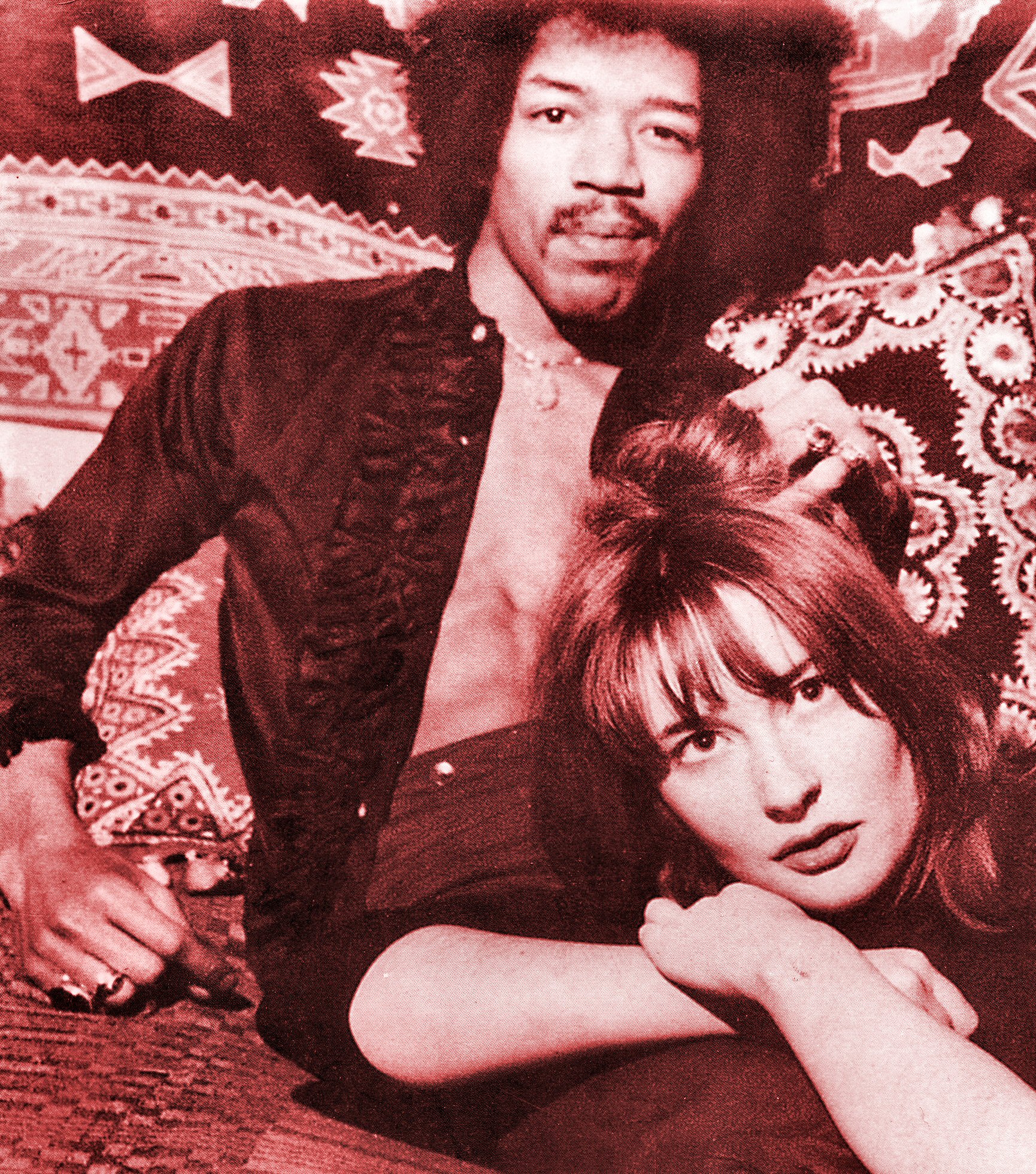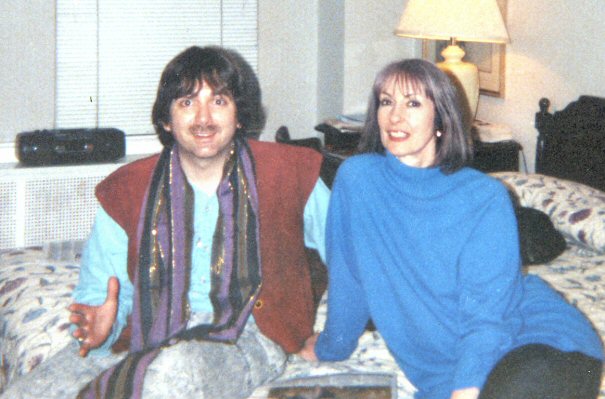
Kathy Etchingham was introduced to Jimi Hendrix in London's Scotch of St. James Club on the evening of Jimi's very first day in England (Sept. 24, 1966). Their mutual attraction was immediate, inspiring one of the longest and most involved love affairs of Jimi's life.
"My girl friend," he said of Kathy in 1969,
"my past girlfriend and probably my next girlfriend. My mother and sister and all that bit. My Yoko Ono from Chester."
Ironically, it was Kathy, along with Dee Mitchell (wife of Mitch), who spearheaded the research which has shocked us all.
More than two decades later, the tireless efforts of these Hendrix heroines have finally shed crucial light onto
tthe most painful and disturbing aspect of Jimi's life - his final hours.
MF: The segment of the Albert Hall film where you and Jimi are in Handel's House sitting on the bed while he plays
Hounddog on acoustic guitar, when was that filmed?

Michael Fairchild & Kathy Etchingham
KE: Somewhere on the tape he's talking about one of the concerts at the Albert Hall. so it was either between
tthe 18th and the 24th or after the 24th. It was during the week, I think it was afterwards, yes it was after.
MF: Who was the guy sitting next to Jimi and the girl next to you?
KE: He was the guy who made the film. Gold & Goldstein. and that was Gold's wife sitting at the end of the |bed. She was either the wife of Steve Gold or Jerry Goldstein, I can't remember which.
MF: What do you remember about that night?
KE: Well, only that there was a knock on the door and I went downstairs to open the door and this bloody great big microphone just came shoving through and the spot lights came on and I thought, "What the hell's going on?" Jimi hadn't mentioned it to me at all.
MF: What were you two doing when they came?
KE: We were just hanging around, we were having a joint, oh well, you know. It wasn't very late, it was early evening that they turned up. There's much more to that film than the bit we've got. They filmed for a long, long
time. But apparently a lot of it was wasted on the cutting room floor. I don't know. I can't remember the exact
sequence leading up to it, but I know that Gold tried to get me to get Jimi to come down stairs because they
wanted to catch him in the street, but he wouldn't go (laughs). He said, "No, what for?"
MF: Was that Jimi's acoustic guitar?
KE: Yeah. that's Jimi's guitar. I think they said, well let's play something, or she said, "Let's play" or whatever,
I mean, as you can see, I had a joint in my hand.
MF: I thought it was a cigarette.
KE: No, it was a joint (laughs). English ones are much bigger. That's what I was passing around (laughs).
MF: Maybe that's why Jimi forgot the words (laughs).
KE: That's right, but that girl took it and then handed it straight back, she couldn't deal with an English one, did
you notice that in the film? And then Jimi's leaning across the bed and he lights somebody's cigarette, right?
That's my cigarette that he's lighting. I can hear my own voice and I remember it anyways.
MF: Around this time, late February 1969, Monika Dannamann says that she was seeing Jimi in London,
which I'm sure must have come as a surprise to you. Have you gone on record yet with any details regarding
your research of Jimi's last night, when he was with Monika?
KE: No, but did you see the article in Rock World? Well, that's as far as it's
got, and I haven't spoken to anyone. I don't speak to anybody about it. I mean, the file is still lodged with the
Attorney General, because although (Ken Voss) has written that they refused to re-open the case, we still have a
nght of appeal through the Attorney General to have a re-opening of the inquest, every person has that right
and that's what we're doing, so it's not a closed book by any stretch of the imagination. That's the only thine I
can say on that point.
MF: Do you have any idea how long it's going to take?
KE: Well, these things move notoriously slowly, as you well know, it's the same in America too, these son of
things go very, very slowly. It could take up to a year or eighteen months for them to make a decision. It's quite
an ordeal, you know.
MF: Monika has raised some questions about the validity of the people claiming to be the ambulance attendants
who found Jimi that morning.
KE: Well, would the London Ambulance Service make a statement (Jan. 3, 1992 letter) like that? Why would
they want to protect two non-existant guys? I am sure they were telling the truth. Their stories were so similar
yet they hadn't seen each other for about twenty years. The important point though is about the report we got
about the stomach contents.
MF: You're talking about the original coroner's report?
KE: We had it re-analyzed.
MF: The rice grains present in Jimi's stomach indicate he died very early in the morning.
KE: It's from the Director of Forensic Medicine at one of our leading hospital, and he studied under professor
Teare (forensic scientist who presented original autopsy report) and he's re-analyzed the findings, they've got
new technology now, him and another guy who's the Consultant Toxicologist, and between them they came up
with the scenario that he had to have died within three hours of eating that rice. So that's the clincher, isn't it?
Because he ate the rice before 3 a.m.
MF: There needs to be a new inquest where all parties involved can be thoroughly cross examined against one
another.
KE: Well that's what we're trying for. It's bloody hard work. You can't argue with an expert. What's she going
to do, say that Dr. Rufus Crompton doesn't exist? That he's not the Director of Forensic Medicine at St.
George's Hospital? I mean, after reading this (report) what would you think? It seems there was about five
hours between the time of death and the ambulance being called.
MF: What was going on in that five hours?
continues...
Go to page 2 of 2
.
Return to Homepage








